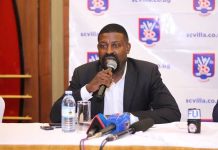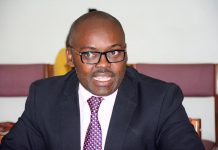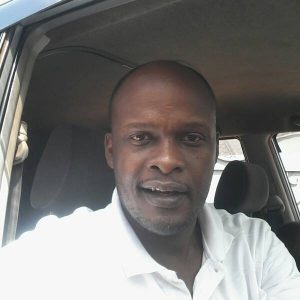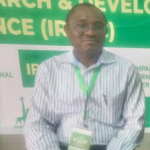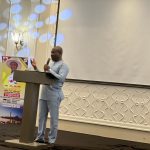Collin Mutambo is the General Manager of Radio Simba.He is one of the most respected radio managers in the country.He shares about his life from childhood and how he ended up where he did.
MT: Where were you born?
Collin: I was born at Mulago, but I am a proud Mugisu hailing from Busano Mbale District
MT: Who were/are your parents?
Collin: My parents are Mzee John Bill Mutambo and Florence Namugenyi
MT: So your mother is from Buganda right?
Collin: Yes, from Luga Mukono District. From the Mamba totem
MT: How many siblings did you have and what was your position within the children in the family?
Collin: We were seven. We lost the eldest.I am the fourth although actually I was the fifth
MT: How was early childhood like as a family?
Collin: I was born and raised in typical conservative family and attended traditional schools. My father was a senior police officer who was quite strict. I remember going out to look for Nsenene with a few village boys and returned home late. I was locked out of the house and slept on the roof.We fought a lot over everything from toys to little girls as we tried to find our space.
MT: Where was the family home?
Collin: We had two. One in Mbale at the village house and the other in Kampala… Kansanga on Gaba Road.
MT: Where did you go to school from daycare to university etc?
Collin: I went to Kampala Nursery school, Nakasero Primary, then Nabumali High School, Kings College Buddo, Makerere University for my first degree, then Georgetown University and Strathmore University
MT: How was life at school?
Collin: Primary school was not easy for me. I didn’t quite know what I wanted. I played too much and didn’t have focus. Secondary school was a lot better for me. I was good with the debating club, and organized quite well. At University, I was also involved in public speaking and was the speaker of Livingstone hall during my time.
MT: What combination did u do at HSC (Advanced Level of Secondary School)?
Collin: We were the pioneers of MEG (Mathematics, Economic and Geography) at Buddo.
MT: When you reached university what course did you do?
Collin: My first degree was BCOM (Bachelor of Commerce) majoring in accounts, then focused on business strategy for my masters.
MT: So how did you enter radio?
Collin: Ha ha ha I knew it was coming down the line. I was working at AAR(Africa Air rescue) when I met Huub Gales, then PD (Program Director) of capital radio. I told him I would love to join radio. He told me, all I needed was to be a good communicator and in fact, invited me for an interview. The interview went well and I was called by Huub to do the Saturday afternoon show. The rest now is history.
MT: So when radio simba was starting you decided to cross over, what made you take such a risky leap at the time?
Collin: Over the years at Capital, I felt I had grown and needed a new challenge. Around the same time, I was told by Elvis Ssekyanzi that they were about to start a new radio station and that I should meet his partner, Aga Sekalala Jr. and see if we could work together. I got an appointment with Aga and I was inspired by his vision and character. Had it not been his foresight, I would probably not have left capital.
I knew that this would be a very different ball game.
Essentially, I had to build a programming philosophy from scratch. And considering that this was going to be a Luganda Station, I had to put a keen interest n the values and aspirations of the luganda speaking audience.
This was a huge milestone for me. And I was not well versed with the language itself. It questioned my perseverance and character.
But with the invaluable guidance of Aga and the team, we managed to pull it off. My most memorable day was when I was told we are going on air in two days. When we thought we still had a couple of months doing training. I almost had a nervous breakdown. I didn’t want anything to go wrong. But, we managed.
MT: Simba became a dominant station in a short time, what do you think contributed to this ?
Collin: I think we were lucky to get a concept right, then got a team that believed in the concept, and added value by adapting the concept to market conditions, put simply.
MT: How different is the radio business now from when Simba started?
Collin: A lot of good things and bad things have happened along the way. On the good side, with increased competition, Radio programming has become more professional and a recognized discipline in its own right. Secondly, investment in radio has been in the up, with even the large edit groups like Vision Group and Nation media investing in radio. Ad spend on radio has also increased and despite the competition, overall media spend on radio has increased year on year.
On the bad side, I see a reduced level of innovation and creativity among radio stations. So many cheap programs on air. Also, there is a sense of dejavu among some radio owners with many opting to hold out for the next big buyer to sell their licence to.
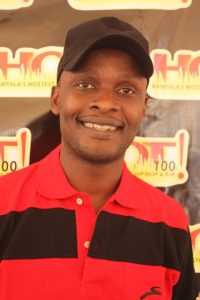
Collin Mutambo representing Hot 100
MT: Then you launched Hot100, what prompted a new station?
Collin: We were looking for a niche radio station. Our many surveys showed an exponential growth in the number of young urban people. The challenge then was that the existing radio stations did not serve this demo in a way we thought was satisfactory. Their favorite songs were always on the periphery, and many of their role models and stars were hardly featured.
Hot100 was born out of this need. Target young people and serve them well.
MT: You also set up Radio Simba Nairobi is that correct?
Collin: Yes. The station in Nairobi was a partnership and most of its programming and Administration was driven by our partners in Nairobi. We mostly provided technical help and guidance where necessary.
MT: Did you get time to explore the nairobi market?
Collin: Yes we did. However, we learnt later that there were more undercurrents in the media space in Nairobi than we thought we knew.
MT: What were some of those undercurrents? (Ethnic or others?)
Collin: Both political and ethnic.A couple of years ago, Kenya was more introverted within the corridors of power. Our whole licensing scheme disfavored us. We struggled to raise our ERP (Effective Radiated Power) in order to boost the signal, all of which were hard to do. Mainly because of our little influence.
Our philosophy seemed quite un Kenyan, and since we were targeting Swahili, we were touching a raw nerve.
MT: Away from radio what are your pastimes, how do you spend your free time?
Collin: Away from Radio, I do lots of fine dining and road trips. I just love getting away from the city for the weekend. It replenishes me.
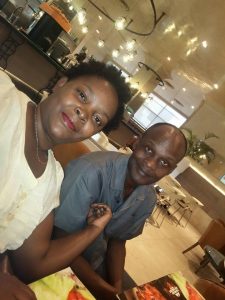
Collin Mutambo and wife Catherine Mutambo
MT: Are you married?
Collin: Yes, to a beautiful Mukiga
MT: Do you have any children as yet?
Collin: Yes, a lively bundle
MT: Do you consider yourself a religious person?
Collin: That is a very good question. And I think many people, especially in the western world misuse it for political correctness. I regard myself as a God loving and fearing person.
MT: When do you think you will retire?
Collin: I would like to retire very soon. I think I have made my modest contribution to media and grooming talent to take over.
MT: What would you like to preoccupy you after retirement?
Collin: I would like to get into less money driven ventures in media like media ministry. I would also hope that I can share my experience with radio greats like yourself.
MT: If someone wanted to become a radio presenter and walked into your office today for advice, what would you tell him or her?
Collin: I would ask them-can you be smarter than an average guy. Because a radio presenter is supposed to do all the hard work. Prepare, research, opine, sooth, comfort, befriend, to name a few. And you need to show me you are smart enough to do this.
MT: Do you ever see a point where radio will become background to television, social media or any other?
Collin: Yes. The radio medium is passive in nature. And yet people are tending towards active media, where they can participate, debate and engage. I see social media morphing into a real systematic medium with functional practice principles. When this happens, and it seems to be so, Radio will become an also run.
MT: Why did you call yourself Collin Mark when on Capital Radio, was mark ever your other name?
Collin: Yes, Mark is my other name. In fact, I was called Mark until I joined Kings College Buddo. Since we had two Marks in class, I decided to go for Collin.
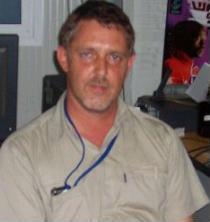
Huub Gales
MT: How did you find working with Huub Gales, what sort of guy was he?
Collin: Huub breathed radio life into me. He had a gifted way in which he could express his displeasure for anything you did on air. He always reminded me of the basics. To him, the basics counted most. Tell people only what they want to hear and nothing more. He was a very exemplary radio personality.
MT: We have always marvelled at the Ekiggunda Concerts, from day one they have been successful,what explains your success with that concert year after year?
Collin: Ekiggunda is sold as a Christmas in July. It’s a mass meet and greet and long time no see event for people from all walks of life. From the word go, we avoided calling it a concert or Kivulu. All advertising and communication focuses on the person/reveller. His experiences, his escapades, his highs and lows at the event. This keeps them coming back year after year.
MT: How is your daily schedule like, let us say on a Tuesday, from home and back to home, how does the day flow like?
Collin: I start the day with my short prayer. At 5.30am, prepare and leave home by 6.30am. I drop my children at school and am at office by 740am. I write some days notes, things I should do and complete today, then have a series of meetings with my heads of department.
I take a lunch break at 1pm and complete my days work at about 6pm. I then head home for some jogging and road work before I retire with a good book to read.



